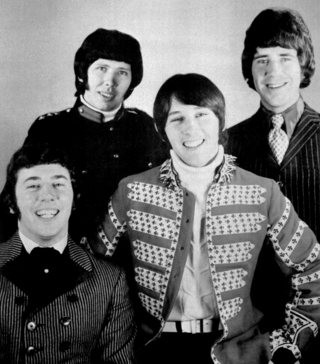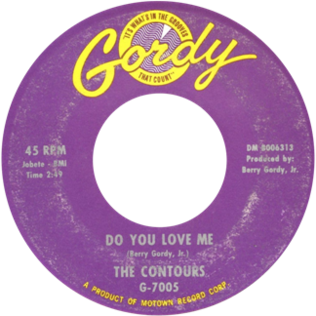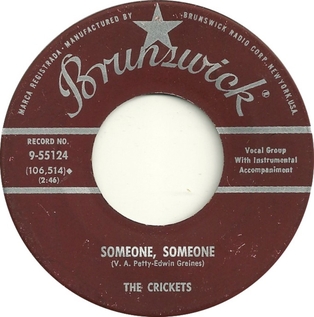Related Research Articles
The Chantays, sometimes credited as Chantay's, is an American surf music band from Orange County, California, United States, known for the hit instrumental "Pipeline" (1963). Their music combines electronic keyboards and surf guitar, creating a unique ghostly sound.

"Twist and Shout" is a 1961 song written by Phil Medley and Bert Berns. It was originally recorded by the Top Notes, but it did not become a hit in the record charts until it was reworked by the Isley Brothers in 1962. The song has been covered by several artists, including the Beatles, Salt-N-Pepa, and Chaka Demus & Pliers, who experienced chart success with their versions.
The Orlons are an American R&B group from Philadelphia, Pennsylvania that formed in 1960. The group won gold discs for three of their singles.
Rosetta Jeanette Hightower was an American singer and the lead singer of the 1960s girl group The Orlons. She was born in Philadelphia.

Alisha's Attic were an English pop duo of the 1990s and early 2000s. The two members were sisters Shelly and Karen Poole, born in Barking and Chadwell Heath respectively. Their father is Brian Poole of 1960s group Brian Poole and the Tremeloes.

The Tremeloes are an English beat group founded in 1958 in Dagenham, England. They initially found success in the British Invasion era with lead singer Brian Poole, scoring a UK chart-topper in 1963 with "Do You Love Me". After Poole's departure in 1966, the band achieved further success as a four-piece with 13 top 40 hits on the UK Singles Chart between 1967 and 1971 including "Here Comes My Baby", "Even the Bad Times Are Good", "(Call Me) Number One", "Me and My Life" and their most successful single, "Silence Is Golden" (1967).
Alexander Emil Caiola was an American guitarist, composer and arranger, who spanned a variety of music genres including jazz, country, rock, and pop. He recorded over fifty albums and worked with some of the biggest names in music during the 20th century, including Elvis Presley, Ray Conniff, Ferrante & Teicher, Frank Sinatra, Percy Faith, Buddy Holly, Mitch Miller, and Tony Bennett.
Brian Poole is a singer and performer who was the lead singer of 1960s beat band the Tremeloes (1957–62) and then Brian Poole and the Tremeloes (1962–66). He was brought up in the East End of London and grew up in Barking, East London. Poole attended Park Modern Secondary School, Barking and Barking Abbey Grammar School.

"Do You Love Me" is a rhythm and blues song recorded by the Contours in 1962. Written and produced by Motown Records owner Berry Gordy Jr., it appeared twice on the Billboard Hot 100 chart, reaching numbers three in 1962 and eleven in 1988.
"Mashed Potato Time" is a 1962 single written by Kal Mann and Bernie Lowe, and performed by Dee Dee Sharp, with backing vocals by The Orlons, on her debut album It's Mashed Potato Time. The song refers to the Mashed Potato dance move, which was a fad. It was one of several songs that at that time that referenced the dance, another being James Brown's "Mashed Potatoes U.S.A." The Marvelettes song "Please Mr. Postman" is mentioned in the lyrics and is copied in the arrangement. Also mentioned in the lyrics are the songs "The Lion Sleeps Tonight" by the Tokens and "Dear Lady Twist" by Gary U.S. Bonds. Sharp recorded a sequel to "Mashed Potato Time" called "Gravy ".
"You Can't Sit Down" was originally recorded in 1959 as "Can't Sit Down" by The Bim Bam Boos on Dasher Records catalogue number D-500 and credited to Dasher - Muldrow; it featured Philip Upchurch on guitar and Cornell Muldrow on organ.

"Non illuderti mai" is a song by Italian singer Orietta Berti, released as a single in April 1968 for the summer festival Un disco per l'estate. The song came in second place at the festival behind "Luglio" by Riccardo Del Turco. It has notably been covered in English as "My Little Lady" by the Tremeloes and in French as "Ma bonne étoile" by Joe Dassin.
"Gee Whiz (Look at His Eyes)" is a song written and performed by Carla Thomas. It reached #5 on the U.S. R&B chart and #10 on the U.S. pop chart in 1961. It was featured on her 1961 album Gee Whiz.
"The Fly" is a song written by John Medora and David White and performed by Chubby Checker. The song was produced by Kal Mann.
"Ride!" is a song written by Kal Mann and Dave Appell and performed by Dee Dee Sharp. It was featured on the 1963 album All the Hits . The single sold over one million copies and was awarded a gold disc.
"The Wah-Watusi" is a song written by Kal Mann and Dave Appell and performed by The Orlons. It reached No.2 on the U.S. pop chart behind Bobby Vinton's "Roses Are Red ", No.5 on the U.S. R&B chart, and No. 12 in Canada in 1962. It was featured on their 1962 album The Wah-Watusi.
"What Will Mary Say" is a song written by Eddie Snyder and Paul Vance. It was originally performed and issued as a single by Mark Dinning in 1961, but did not chart. Two years later, the song was recorded and released by Johnny Mathis, who made the song a popular hit. Mathis' version of "What Will Mary Say" reached #3 on the adult contemporary chart, #9 on the U.S. pop chart, #21 on the U.S. R&B chart, and #49 on the UK Singles Chart in 1963.

"Candy Man" is a song by Roy Orbison, released as the B-side to his international hit "Crying" in July 1961. It was later covered by British beat group Brian Poole and the Tremeloes, becoming a top-ten hit in the UK.
"Twenty Miles" is a song written by Kal Mann and Bernie Lowe and performed by Chubby Checker. In 1963, the track reached No. 15 on both the U.S. R&B and the Billboard Hot 100.

"Someone, Someone" is a song by American rock and roll band the Crickets, released in March 1959 as the B-side to "Love's Made a Fool of You". However, the song is better known for the version by British beat group Brian Poole and the Tremeloes, which became a top-ten hit in the UK in 1964.
References
- ↑ "The Orlons, "South Street" Chart Positions" . Retrieved March 11, 2019.
- ↑ "CHUM Hit Parade - April 1, 1963".
- ↑ "The Orlons, South Street by The Orlons". Discogs . 1963. Retrieved March 11, 2019.
- ↑ Jay, Melannie. "A Tour of Philadelphia Through Music," 34th Street (magazine), Monday, February 25, 2019. Retrieved April 19, 2023.
- ↑ Murrells, Joseph (1978). The Book of Golden Discs (2nd ed.). London: Barrie and Jenkins. pp. 149 & 164. ISBN 0-214-20512-6.
- ↑ "Top Records of 1963", Billboard , Section II, December 28, 1963. p. 30. Retrieved March 11, 2019.
- ↑ Kowal, Barry. Billboard Magazine's (USA) Top 100 Single Recordings of 1963, Hits of All Decades. August 27, 2017. Retrieved March 11, 2019.
- ↑ "Al Caiola and His Orchestra, Greasy Kid Stuff". Discogs . 1963. Retrieved March 11, 2019.
- ↑ "Sammy Lowe, Hitsville, U.S.A.". Discogs . 1963. Retrieved March 11, 2019.
- ↑ "Brian Poole& The Tremeloes, Twist and Shout". Discogs . 1963. Retrieved March 11, 2019.